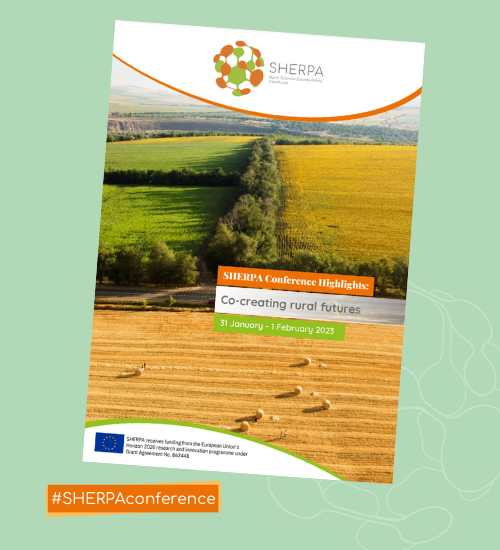In 2023, SHERPA third Annual Conference (31 January-1 February 2023) and the first in-person after the COVID pandemic, looked back at the achievements reached over the past year. In particular, the conference covered several topics discussed by its 41 Multi-Actor Platforms (MAPs) in 2022, including rural digitalisation, climate change and land use, resilient and sustainable value chains, and social issues in rural areas. With less than one year before the project’s end, this conference was also an opportunity to reflect on its final steps and the future of SHERPA MAPs beyond the closing of the project (set for September 2023). A report was produced, highlighting some of the most important discussions undertaking during SHERPA Annual Conference 2023.
SHERPA’s contribution to the Long-Term Vision for Rural Areas
Since 2019, SHERPA involved more than 630 people from over 17 countries, engaged in 125 meetings and established 41 MAPs at different levels, including one at European level, and developed an online repository gathering information and results from around 800 rural projects. SHERPA has also developed thematic recommendations and Position Papers for the future of rural areas. Hence, the first part of the conference pointed out SHERPA’s contribution to the European Long-Term Vision for Rural Areas (LTVRA). In this framework, Alexia Rouby from the European Commission – DG AGRI, presented the latest achievements and next milestones of the LTVRA, such as the recently launched European Rural Observatory, the Rural Pact support office and the forthcoming stocktaking on programming of the Common Agricultural Policy and Cohesion Policy. Ms Rouby congratulated SHERPA partners for bringing valuable inputs and the project’s practical model that can inspire engagement processes in the Rural Pact.
Interactive workshops for rural areas
A large part of the conference has been dedicated to discussing SHERPA’s results and future tasks. Through interactive workshops, attendees have discussed SHERPA’s recommendations on the rural digitalisation, climate change and land use, resilient and sustainable value chains, and social issues in rural areas. These recommendations will be soon published in SHERPA website.
In addition, attendees have look into how SHERPA MAPs– and their unique methodology to create science-society-policy interfaces for rural territories- could be kept alive after the project’s end. In particular, attendees discussed on the added value and key ingredients of these MAPs, as well as financing and governance models for their continuation. The majority of those participating in SHERPA Annual Conference agreed that MAPs should keep their work further contributing to shaping rural areas and providing inspiration for future research through their integration into existing networks, shared and collective leadership, balancing of expertise and new business models and financing. Discover their consultation and recommendations in the conference report!
The steps forward
Over the next months, SHERPA MAPs will work and deliberate on topic of multi-level governance. In addition, SHERPA final conference will take place in Brussels- Belgium, on 1-2 June 2023.
Find out more
Read the outputs of discussions in our SHERPA conference report and access speakers’ presentations in this webpage.
Published by Raphael Garcia
